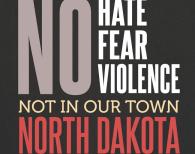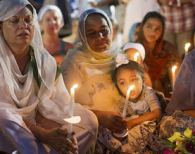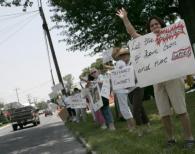white supremacist
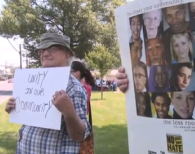
Gettysburg, PA, site of the famous battle that many consider a turning point in the Civil War, is commemorated annually with festivals, military re-enactments and celebrations of the town's rich history. This month marks the 150th anniversary of the historic battle.
Although America has become more inclusive, hate still sometimes rears its ugly head. In June 2010 the Aryan Nations came to Gettysburg to hold a rally on the historic battlefield where Abraham Lincoln delivered his most stirring defense of American democracy. The Adams Unity Coalition—a group made up of several local organizations—came together to hold their own peaceful rally across town that celebrated and embraced the diversity in their community. Check out this modern story of safety and inclusion in this video featuring the Adams Unity Coalition:

This is the second in a five-part series published by our public media partneras at Fronteras. Listen to the accompanying radio piece.
By Adrian Florido
SAN DIEGO — Detective Ellen Vest investigates hate crimes for the San Diego County Sheriff’s Department, and she recently recalled a case in which a white skinhead attacked an African-American man outside a bar, causing brain damage.
Vest thought the assault was a hate crime.
“He had one swastika on his shoulder that he displayed to our African-American victim. So we served a search warrant on his house,” she said of the suspect, who was ultimately convicted. “He had a money clip that had a little KKK man on it, with a burning cross. He didn’t have a lot, but what he did have was really pretty specific to show he was a biased individual.”
To convict a suspect of a hate crime, proving that bias is critical. And for detectives like Vest, one of the best ways to do that is by looking for those hate symbols.
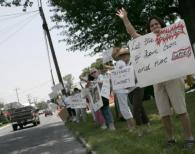
Gettysburg, PA: When folks in Gettysburg, PA heard the Aryan Nations hate group was planning a rally on the very spot where Abraham Lincoln delivered his most famous defense of American democracy, they knew they couldn't sit by in silence."Silence is the welcome mat for hate," notes Ann Van Dyke of Pennsylvania's Human Relations Commission, who has worked with almost two dozen communities throughout the state that were targeted by hate groups. The activist groups that formed in those towns are now part of the Pensylvania Network of Unity Coalitions, longtime members of the Not In Our Town family.In Gettysburg, the Adams Unity Coalition had just six weeks to prepare. They had limited resources. And they had to compete with almost a dozen other festivals taking place that same weekend.
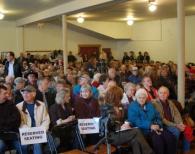
Update: People in Grant County are taking swift action to make sure the Aryan Nations stay away from their community. In the midst of a packed forum sponsored by the local newspaper, community members began organizing a lime green ribbon campaign. Tony Stewart and Norm Gissel, leaders of the Kootenai County Human Rights Task Force shared their successful strategies for dealing with the neo-Nazis. Read more in the Blue Mountain Eagle.
Grant County, OR: The Blue Mountain Eagle newspaper in John Day, Oregon, is sponsoring town hall forums this Friday, Feb. 26, to air community concerns about plans by the Aryan Nations to relocate its national headquarters to their small town.
When they heard that the hate group's leader was shopping around town recently, looking to buy property for a new compound, store owners and residents poured into the streets to proclaim that the white supremacist organization is not welcome in this community.
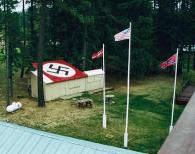
How Ordinary Citizens of Northern Idaho Defeated the Aryan Nations
By Tony Stewart and Norm Gissel, Kootenai County Task Force on Human Relations
In the 1950’s a small group of religious leaders, fed up with Jim Crow racism, started the modern civil rights movement. They demanded that the promises of the Declaration of Independence and the 14th Amendment, declaring equal protection under the law to all citizens, finally be enforced. The vast majority of Americans agreed. What followed was a sea change in the cultural and political life of America. Millions of Americans were recognized for the first time as full members of our great country, and almost overnight, civil rights, formerly a fringe concern, became a mainstream one of most Americans.
But as history has shown us, in a democracy, great cultural and political changes do not occur without a large array of opponents.
